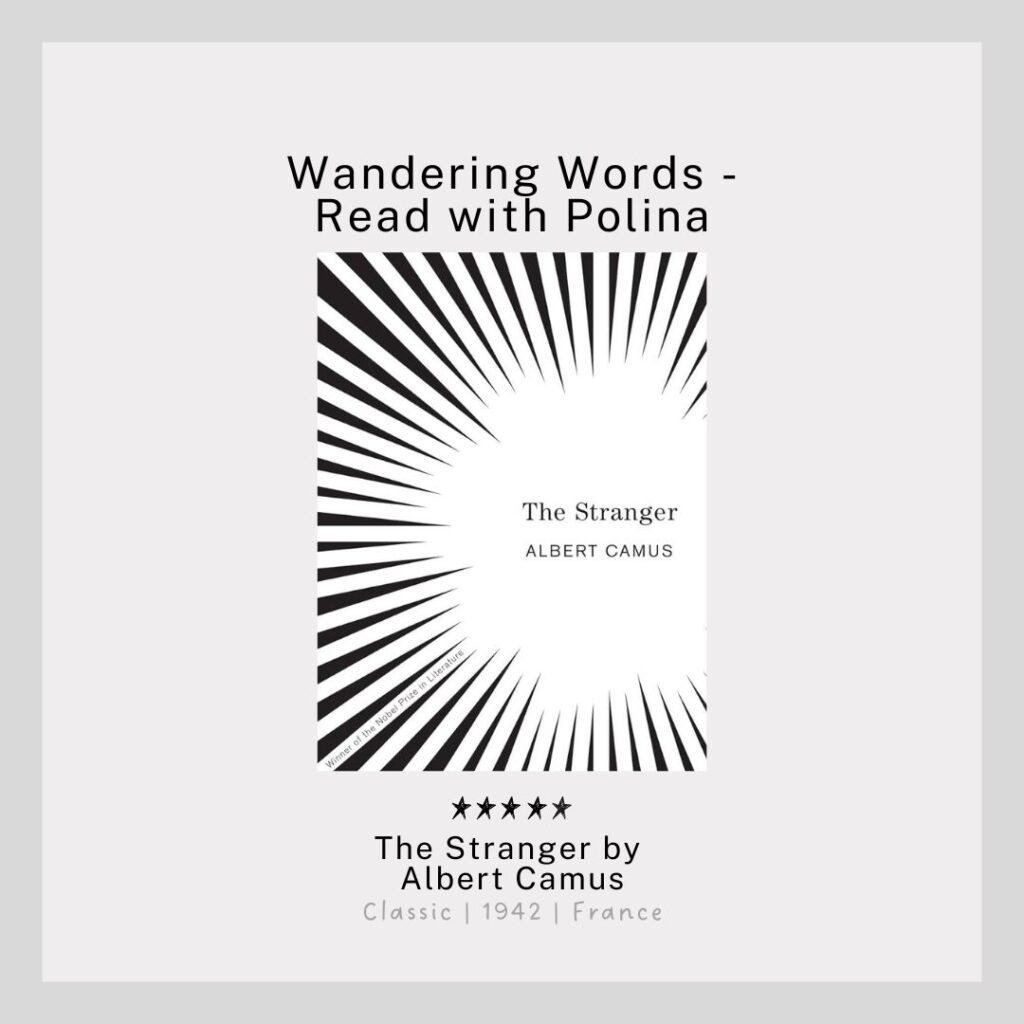Classics aren’t popular with most people. We associate them with dull English assignments, a complaining class and words too big to understand. However, when we CHOOSE to read them ourselves, it’s like our eyes open. Or, at least, that is what happened to me. Here is my book review and musings on The Stranger by Albert Camus.

Plot Overview
This book starts off with a bang. Our narrator, Meursault Antichrist (though we do not know his name at first) gets a telegram saying his mother is dead. From the start, we are faced with Meursault’s peculiar philosophy in life – his seeming indifference to even the most pivotal events. “But what does it matter?” seems to be his signature phrase. He views the world with a gentleness, but one stemming from a lack of empathy and care. He does things entirely based on his current feelings and whether or not it is convenient to him. Still, his life is an unobtrusive one, devoid of rebellion or hatred.
Meursault visits his mother’s wake, and then her funeral. He does this through a veil of grey fatigue, and observes the behavior of the people around him. After the funeral, he goes to meet with Marie, who is just that to him – Marie. Not girlfriend, mistress, or wife. They go to the movies together and spend time happily.
Throughout the book, Meursault meets many strange people from various walks of life. They are all people of dubious morality, and most would say their actions make them inherently evil. Our narrator doesn’t see it that way – these actions are not ones he would do, but he can see why they do them. Each atrocity these people commit stem from a deep rage, something Meursault has never felt before.
One of the people Meursault meets is named Raymond. He invites him to his summer beach house, and Meursault goes with Marie. This is where, almost exactly at the halfway point, the genre of this book seems to change entirely. The pivotal moment, the one which you’ll know if you’ve heard of this book – the murder.
After that, the book got a lot more interesting to me. We explore human psychology, Meursault’s peculiar reasons for what he did, and the naked absurdity of man faced with death.
Glimmers of Humanity
After a while of living inside Meursault’s head, things inside his world seemed to lose meaning. People came and went, the day shifted from day to next dawn, the sun rose and the seasons changed temperature. It seemed that our narrator lived his life in a constant state of neutrality, with a matter-of-factness that we, the readers, get used to. We stop being surprised at some of the atrocities committed, because our narrator is our touch-point in the book. If he doesn’t care, we don’t, either.
When Meursault murdered the man, it felt like the first true show of emotion we’ve seen from him. The sun sharpened its claws, the sentences grew longer and more rambling, and I felt the touch of sweat on my own skin. Despite all the different ways the scenario could have gone, the intensity of his physical discomfort made me understand why he did something as “inhumane” as murder. The way the author phrased the encounter made me feel, as Meursault felt, the impossibility of doing anything else. The way he was forced to pull the trigger.
This same haunting beauty is what I felt from the author’s description of Meursault facing his own death at the end of the book. Facing death itself can unravel any person. How are you supposed to stay indifferent, when faced with the world’s own indifference in the face of your end? We all long to be remembered.
The rambling paragraph near the end of the book felt like a stream from Meursault’s very soul. Suddenly, I understood what every character meant in the context of our narrator himself. I read this paragraph countless times, and each time, a different meaning revealed itself to me. I was filled with a vastness difficult to explain. We often hear about “flashbacks” people experience near death, where they recount every significant moment they’re lived. Here, I felt something similar – like at the very end, Meursault took the tangled, separate threads of his life and tied them together into a tapestry. Everything came into focus.
On Morality
Meursault was immoral. So was Raymond, and Marie, and every other character in this book. They were immoral because they were human. Aren’t we all, as people, inherently “impure”? I found it really interesting to get into Meursault’s head, a murderer and a person full of apathy, that nevertheless felt so humane. He did things that I would never forgive in real life. And yet, strangely, I rooted for him, because while reading this book he was no “stranger” to me. I was him, or at least, viewed the world from his eyes.
It’s always a completely different experience to read a book with an unreliable and/or morally grey protagonist. We aren’t sure if what they are seeing and feeling is the truth, and that makes the book all the more interesting to read.
In Conclusion…
I really enjoyed The Stranger. It’s a book that makes you think on morality and the inherent justice of death (because, aren’t we all privileged to even be alive?) and the fear of it. This book has short and snappy sentences at the beginning without much emotion, but it gets more elaborate as Meursault unravels. I found the unreliable narration of Meursault to be really interesting. If you’re looking for a short book that gives you a lot of food for thought, The Stranger is a beautiful choice.

Leave a Reply